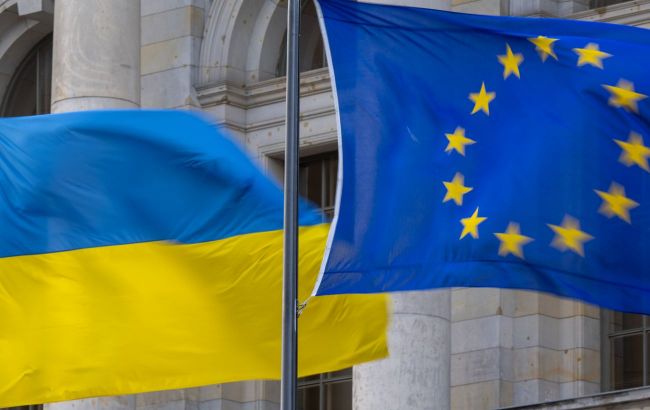Ukraine teeters on economic brink without EU and U.S. financial aid, Politico
 Illustrative photo (Photo: Getty Images)
Illustrative photo (Photo: Getty Images)
The leaders of EU countries are set to vote on providing Kyiv with €50 billion in assistance at the summit on February 1. Without this, along with funding from the U.S., Ukraine will struggle to continue its fight against Russia or sustain its economy for long, reports Politico.
"We are not currently even considering an option of not receiving this assistance. It is critical for us, because the timeliness and completeness of non-military spending depends on it," told Politico Danylo Hetmantsev, chairman of the Ukrainian Parliament on Finance, Tax and Customs Policy.
According to the article, Kyiv is currently using the funds it can gather domestically for the development of its own military industry, salaries for soldiers and other security service personnel, as well as the protection of pensioners and displaced persons. Western credits and grants cover the expenses for purchasing and servicing foreign weapons, as well as crucial social expenses like the salaries of public servants, medical, and educational workers. This year, the government plans to receive financial aid totaling $37 billion, which will almost cover the budget deficit estimated at $39 billion.
According to the Center for Economic Strategy, since the Russian invasion in February 2022, Western sponsors have provided financial aid of approximately $73.6 billion. Through the International Monetary Fund, Ukraine will receive a total of $122 billion from 2023 to 2027.
The European Union and the United States aid packages
However, the flow of Western funds has slowed to a minimum in recent months, as conflicts in the Middle East and the beginning of the year brought the largest war in Europe in 80 years to the back burner of news. This month, Ukraine has not received any official financial aid.
Prime Minister Viktor Orban of Hungary and Robert Fico of Slovakia have opposed providing any additional aid to Ukraine from the EU budget, arguing that funding should be divided into four tranches, each of which can be blocked at any time. Orban, in particular, is currently facing increasing pressure to cease resistance.
Meanwhile, in the U.S., financial aid to Ukraine has become a hostage in the struggle between Republicans and Democrats over border policies. Despite President Joe Biden's support, House Representative Mike Johnson demanded that the White House clarify its ultimate goal in Ukraine before voting on new aid to Kyiv.
"And while the fights in Washington and Brussels play out, Kyiv is holding its breath in silence, hoping not to hurt its chances of getting crucial support," Politico noted.
Position of the National Bank of Ukraine (NBU)
Not all officials are as pessimistic as Hetmantsev. The country has accumulated over $40 billion in foreign exchange reserves and can point to improvements in tax collection and the ability to attract funds through domestic borrowing.
"Ukraine will be able to sustain itself for some time at the expense of its own domestic resources," said Andriy Pyshnyy, the head of the NBU, according to Politico. "Although risks to the regularity and timeliness of international aid inflows have materialized, we remain optimistic."
Printing money
But the harsh reality, says Maria Repko, deputy director of the Kyiv Center for Economic Strategy, is that it is impossible to cover half of the state expenditures from internal sources in a country at war, not least because Russia cut off a chunk of Ukraine, which accounted for a quarter of its GDP.
GDP fell by 28.8% in the first year of the war and only recovered a meager 5% last year, even with the influx of foreign aid equivalent to 20% of GDP, according to Politico.
"If in 2023 we discussed other risks, such as a decrease in exports due to the closure of the Black Sea and the risks associated with the Russian offensive, all analysts agree now that the biggest risk this year is not getting aid," said Repko.
Without aid and with international credit markets closed to it, the only way for Kyiv to continue meeting its internal obligations would be to print money, Repko said.
A minor sum
Even Pyshnyy acknowledges that rejecting aid will mean "redistributing the Ukrainian economy’s limited resources toward priority budget needs." Thus, he says, it's "critically important to have international funding restored."
One of Ukraine's strongest arguments in favor of continuing support remains the fact that its failure will ultimately prove more expensive for Europe. According to them, Ukraine's defeat will require a massive and long-term increase in military spending across the continent to restrain a revanchist neo-imperial Russia.
"Ukraine’s victory is key to easing security risks on the Continent," said Pyshnyy, noting that the €50 billion package to be approved this week is a trifle compared to the overall European economy.
In December, there were difficulties in approving the $60 billion aid package for Ukraine in the U.S. Congress, as well as the European Union's aid package for the years 2024-2027 amounting to €50 billion.

